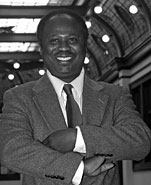
On the sidelines when Europe colonized Africa in the 19th century, the United States’ role on the continent changed when decolonization began after World War II, said Ghana native Randolph Quaye.
Quaye, director of the Black World Studies program at Ohio Wesleyan University, spoke about U.S. policy toward Africa in the latest meeting of the Great Decisions Lecture Series Friday.
“I think it is very difficult for me to talk about one specific U.S. policy toward Africa,” Quaye said.
That is because each African country is different, requiring different policies from Washington, D.C. Colonization of Africa resulted from the Berlin Conference of 1884-1885, creating neighboring countries with diverse backgrounds, he said.
“The U.S. was just an observer,” Quaye said. “The U.S. never took part in colonizing any of these countries.”
After World War II, charismatic leaders who favored socialism began emerging in Africa. With the decolonization process supported by the Soviet Union and the People’s Republic of China, the United States was forced to step in.
“I feel the U.S.’s relationship with Africa has been mixed,” Quaye said. “The major U.S. advancements in Africa have been made in the health field.”
Quaye said the African Growth and Opportunity Act passed by the U.S. Congress in May 2000 advanced more open economic policies with African countries and helped build free markets. Greater integration of three economic unions in Africa also was promoted by the U.S. That led to more American influence on the continent.
The U.S. also has promoted democracy and improved health care.
“We are seeing a gradual reduction in the number of people with HIV/AIDS, specifically in East Africa,” Quaye said.
The war on terror is a continuing problem in many African countries, Quaye said. The U.S has established military zones in Libya, Ghana, Kenya, Liberia and Tunisia.
Stephanie Smith, a Delaware County resident who came with her daughter, Kathy Kelly, said, “I enjoyed the lecture tremendously because I don’t know a lot about Africa. I’ve learned so many things about different parts of the world.”
The Syrian refugee crisis will be the topic at the next Great Decisions lecture on March 6 at noon in the William Street United Methodist Church.